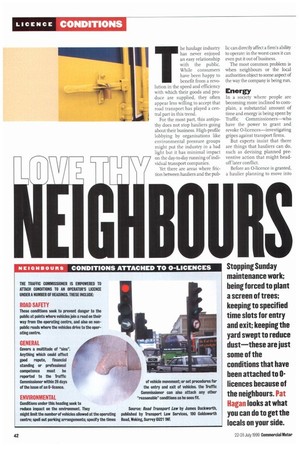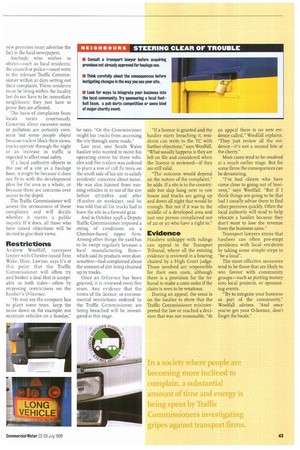T he haulage industry has never enjoyed an easy relationship with
Page 44

Page 45

If you've noticed an error in this article please click here to report it so we can fix it.
the public. While consumers have been happy to benefit from a revolution in the speed and efficiency with which their goods and produce are supplied, they often appear less willing to accept that road transport has played a central part in this trend.
For the most part, this antipathy does not stop hauliers going about their business. High-profile lobbying by organisations like environmental pressure groups might put the industry in a bad light but it has minimal impact on the day-to-day running of individual transport companies.
Yet there are areas where friction between hauliers and the pub
lic can directly affect a firm's ability to operate: in the worst cases it can even put it out of business.
The most common problem is when neighbours or the local authorities object to some aspect of the way the company is being run.
Energy
In a society where people are becoming more inclined to complain, a substantial amount of time and energy is being spent by Traffic Commissioners—who have the power to grant and revoke 0-licences—investigating gripes against transport firms.
But experts insist that there are things that hauliers can do, such as devising planned preventive action that might headoff later conflict.
Before an 0-licence is granted, a haulier planning to move into new premises must advertise the fact in the local newspapers.
Anybody who wishes to object—such as local residents, the council or police—must write to the relevant Traffic Commissioner within 21 days setting out their complaint. These residents must be living within the locality but do not have to be immediate neighbours; they just have to prove they are affected.
The basis of complaints from locals varies enormously Concerns about excessive noise or pollution are certainly common but some people object because trailers block their views, trucks operate through the night or an increase in traffic is expected to affect road safety.
If a local authority objects to the use of a site as a haulage base. it might be because it does not fit in with the development plan for the area as a whole, or because there are concerns over access to the depot.
The Traffic Commissioner will assess the seriousness of these complaints and will decide whether it merits a public inquiry: If it does, all those who have raised objections will be invited to give their views.
Restrictions
Andrew Wool fall, transport lawyer with Chester-based firm Wake, Dine, Lawton, says it's at this point that the Traffic Commissioner will often try and broker a deal that is acceptable to both sides—often by imposing restrictions on the ha tiller's 0-licence.
He may say the company has to plant some trees, keep the noise down or, for example, not maintain vehicles on a Sunday," he says. 'Or the Commissioner might bar trucks from accessing the site through some roads."
Last year, one South Wales haulier who wanted to move his operating centre for three vehicles and five trailers was ordered to plant a row of 12ft fir trees on the south side of his site to satisfy residents' concerns about noise. He was also banned from running vehicles in or out of the site before oToolars and after 8:oohrs on weekdays, and he was told that all his trucks had to leave the site in a forward gear.
And in October 1998 a Deputy Traffic Commissioner imposed a string of conditions on a Cheshire-based tipper firm. Among other things the yard has to be swept regularly because a local manufacturing firm— which said its products were dustsensitive—had complained about the amount of dirt being churned up by trucks.
Once an 0-licence has been granted, it is reviewed every five years. Any evidence that the terms of the licence, or environmental restrictions ordered by the Traffic Commissioner, are being breached will be investigated at this stage.








































































































